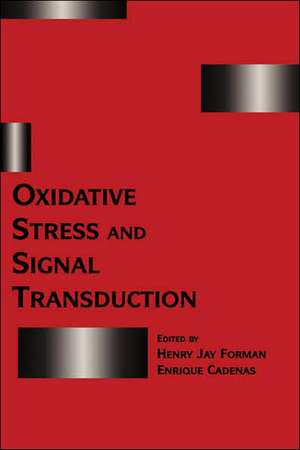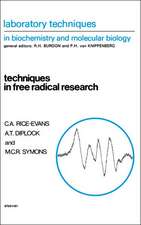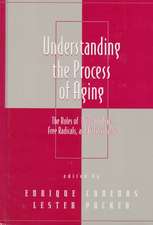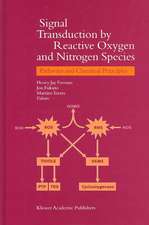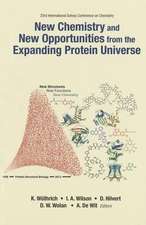Oxidative Stress and Signal Transduction
Autor H.J. Forman, Enrique Cadenasen Limba Engleză Hardback – 30 iul 1997
| Toate formatele și edițiile | Preț | Express |
|---|---|---|
| Paperback (1) | 1220.54 lei 43-57 zile | |
| Springer Us – 26 sep 2012 | 1220.54 lei 43-57 zile | |
| Hardback (1) | 1231.32 lei 43-57 zile | |
| Springer Us – 30 iul 1997 | 1231.32 lei 43-57 zile |
Preț: 1231.32 lei
Preț vechi: 1501.62 lei
-18% Nou
Puncte Express: 1847
Preț estimativ în valută:
235.61€ • 246.66$ • 194.95£
235.61€ • 246.66$ • 194.95£
Carte tipărită la comandă
Livrare economică 07-21 aprilie
Preluare comenzi: 021 569.72.76
Specificații
ISBN-13: 9780412076817
ISBN-10: 0412076810
Pagini: 475
Ilustrații: XV, 475 p.
Dimensiuni: 155 x 235 x 30 mm
Greutate: 0.84 kg
Ediția:1997
Editura: Springer Us
Colecția Springer
Locul publicării:New York, NY, United States
ISBN-10: 0412076810
Pagini: 475
Ilustrații: XV, 475 p.
Dimensiuni: 155 x 235 x 30 mm
Greutate: 0.84 kg
Ediția:1997
Editura: Springer Us
Colecția Springer
Locul publicării:New York, NY, United States
Public țintă
ResearchDescriere
In the past few years there has been the increased recognition that the effects of oxidative stress are not limited to the damage of cellular constituents. There is now evidence that reactive oxygen species (ROS) can alter cell function by acting upon the intermediates, or second messengers, in signal transductions. Such effects on signaling mechanisms probably account for the role of oxidative stress in inflammation, aging, and cancer. This volume brings together internationally recognized researchers in both the major areas covered by the book, oxidative stress and signal transduction. The work is organized in three sections. The first deals with the immediate cellular responses to oxidative stress and the production of second messengers. The second details the connection between second messengers and the gene. The third part looks more closely at the level of the gene.
Cuprins
Introduction. Section I. Immediate cellular responses to oxidative stress and the production of second messengers - Activation of the nitric oxide - cyclic GMP signal transduction pathway by oxidative stress; Peroxynitrite and cell signaling; Nitric oxide signaling through mitochondrial calcium release; Phospholipase A2 activation: an early manifestation of oxidative stress; Oxidant-mediated activation of phospholipases C and D; Peroxide tone in eicosanoid signalling; Protein kinase C as a sensor for oxidative stress in tumor promotion and chemoprevention; Tyrosine phosphorylaiton in oxidative stress; Reactive oxygen intermediates as signaling molecules regulating leukocyte activation. Section II The connection of oxidative induced changes in second messengers and transcription factors with activation of gene expression - Reactive oxygen species as primary signals and second messengers in the activation of transcription factors; STAT activation by oxidative stress; The antioxidant response element; Oxyradicals as signal transducers. Section III Gene expression in reponse to oxidative stress - Modulation by oxidant and antioxidants of signal transduction and smooth muscle cell proliferation; The role of heme oxygenase - 1 in the mammalian stress reponse: molecular aspects of regulation and function; Induction of gene expression by environmental oxidants associated with inflammation, fibrogenesis and carcinogenesis; Regulation of glutathione peroxidases; Gene expression of DT-diaphorase in cancer cells.
